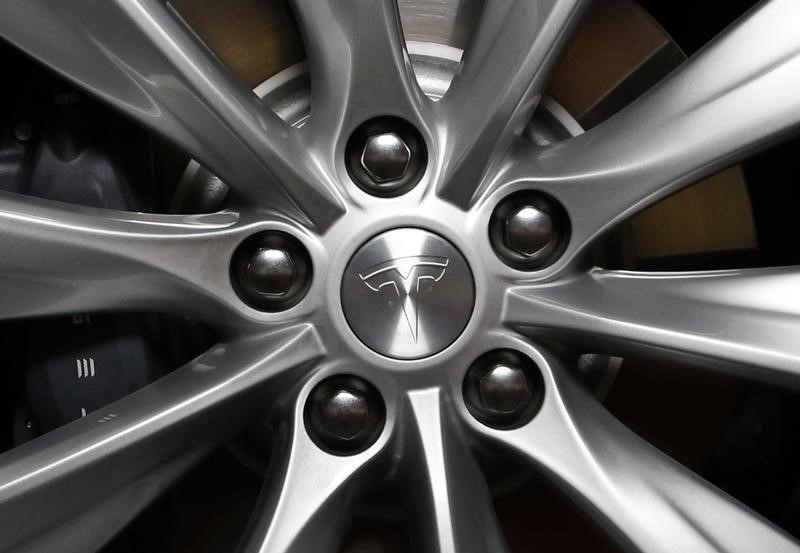By Nichola Groom and Paul Lienert
LOS ANGELES (Reuters) - Tesla Motors Inc (O:TSLA) on Thursday unveiled Tesla Energy - storage systems or batteries for homes, companies and utilities that will expand its business beyond electric vehicles and tap into a fast-growing area of the energy industry.
Chief Executive Elon Musk said the company's goal was to "fundamentally change the way the world uses energy on an extreme scale." He introduced the products to a crowd of business partners and journalists at a Tesla facility near Los Angeles.
In Tesla's view, such storage systems could become part of a fossil-fuel-free lifestyle in which people can have solar panels on their roof generating electricity to power their home and recharge their electric car batteries.
The smallest battery unveiled on Thursday, known as Powerwall, is housed in a six-inch-wide container that is meant to be hung inside a garage or on the outside wall of a house.
At $3,500 for a 10kWh model, excluding inverter and installation prices, the Powerwall can be used for backup power or to store solar energy.
Tesla's lead installation partner for the home battery will be SolarCity Corp (O:SCTY), the solar installer backed by Musk. The company will also partner with many others, Musk said.
Tesla has several hundred batteries installed with SolarCity systems in California already. The growth of those projects has been helped by a subsidy from California's public utility regulator.
Utilities have also been seeking out energy storage to help manage increasing amounts of renewable energy on the grid. To address that market, Musk unveiled what he called the "power pack," a 100 kWh battery block that is meant to help smooth out power from intermittent solar and wind energy production or add energy to the grid quickly when demand levels are high.
Tesla already has several utility-scale batteries deployed on the grid in California, which requires its biggest utilities to source large amounts of energy storage.
Musk told reporters Tesla expected to have a low but growing gross margin in battery products in the fourth quarter of this year and added that battery products would be "materially profitable" some time next year.
"A cost effective home energy storage system it could prove far more valuable, and profitable, than anything the company is doing with automobiles," Karl Brauer, a senior analyst with auto industry research firm Kelley Blue Book, said.
Tesla will initially manufacture the batteries at its automobile factory in California but will move production to its planned "gigafactory" in Nevada next year.
Deutsche Bank (XETRA:DBKGn) estimated sales of stationary battery storage systems for homes and commercial uses could yield as much as $4.5 billion in revenue for Tesla. Analysts expect Tesla will build stationary storage systems around the same basic batteries it will produce for its vehicles at the large factory the company is building in Nevada.
Though valued at just $200 million in 2012, the energy storage industry is expected to grow to $19 billion by 2017, according to research firm IHS CERA.
Tesla is not the only player in energy storage. Coda Energy, which rose from the ashes of a failed EV maker and is now owned by Fortress Investment and startups backed by the likes of Total (PA:TOTF), GE (N:GE) and Siemens (DE:SIEGn) are among the many companies going after shares of the stationary storage market.
